Terry Odell's Blog, page 283
May 4, 2011
Teller County Ride Along 1
What I'm reading: Secrets to Die For, by L.J. Sellers, Seize the Fire, by Laura Kinsale
Thanks so much to Helen for her fascinating post about literary salons. I'm sure everyone enjoyed that quick trip across the pond.
As promised, a recap of my ride along with a Teller County deputy. It's a long post, so it'll be spread over 2 days.
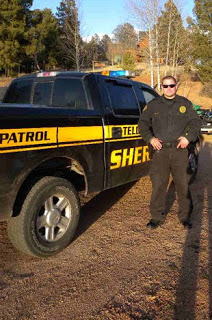 I chose the noon shift, since I didn't particularly want to be riding around in the dark. I arrived bearing the cookies I'd baked the day before. The clerk at the desk took them back to the deputies, and said they were pounced upon. I waited a few minutes, and Deputy Kennedy came for me. He gave me a quick tour of the building, and introduced me all around. I met the only Hawaiian deputy in Teller county. Deputy Kennedy introduced me as his "rider" although it took a while for it to register that he wasn't saying "writer."
I chose the noon shift, since I didn't particularly want to be riding around in the dark. I arrived bearing the cookies I'd baked the day before. The clerk at the desk took them back to the deputies, and said they were pounced upon. I waited a few minutes, and Deputy Kennedy came for me. He gave me a quick tour of the building, and introduced me all around. I met the only Hawaiian deputy in Teller county. Deputy Kennedy introduced me as his "rider" although it took a while for it to register that he wasn't saying "writer."
Dispatch was "manned" by two women, one of whom was being trained. Everything goes through there. It was a far cry from the bustle of the Orlando Command Center I toured as part of their Civilian Police Academy, but the job they do is the same.
The interrogation room is much more "comfortable" than the one in Orlando. This one had a round table, chair, and even a small sofa. There was a camera in the ceiling, and the deputies could monitor questioning from their office. In Orlando, the room I looked at was sterile, with a small table bolted to the wall, 2 chairs, and no camera. If they wanted to video something, they brought in a human with a camera.
We headed out in a marked Ford Expedition, the typical patrol "car" up here. (I know the picture is a Ford F-150. The vehicle Deputy Kennedy normally used was in the shop, and he'd been rotating to a different car every shift. At the end of the day, he was assigned the truck as his 'new' regular vehicle. Since the rules said no pictures on the ride along, I took this one the next day when he stopped by.)
His routine is simply to drive all over the county, route of his choice, unless he gets a specific call. So, we headed out from the Sheriff's Department up into the mountains, toward Victor and Cripple Creek. Nothing wrong with the scenery, although there were more critters than cars. It was a beautiful sunny day, and we passed fields filled with prairie dogs and little gray ground squirrels. We must have seen a hundred deer.
We did a number of traffic stops (don't know why I keep saying "we", since I was merely a passenger!) for speeding. For the most part, unless they're doing something terribly wrong, he gives them a warning. When approaching a car for a traffic stop, the officer will come up from the rear and make sure the trunk is closed. Don't want any bad guys hiding in there.
(Note: the Sheriff was a guest at a property association Neighborhood Watch meeting, and he said the county makes very little money, if any, from ticketing drivers. They want to catch felons. For the most part, a warning to drive more carefully is the standard.)
Major difference between Orlando and up here: the deputies here have no computers in their cars. They have to radio the plates to Dispatch at their headquarters, and get the response as to whether the driver is licensed, insured, or has any outstanding warrants. Deputy Kennedy is looking for the warrant part.
The glitch in the system is that the radios don't always work well. I suppose deputies get used to "translating" the garble, but I couldn't understand a lot of it, simply due to poor reception.
They also don't have GPS units in their vehicles. The deputy will inform Dispatch where he is at any given moment (although up in the mountains, it's not exactly like saying, "the corner of Third and Main.") But given the remote location and the relatively limited numbers of patrol vehicles out at any given time, these guys are basically on their own, and backup can be far away.
(Another note: I noticed that although Deputy Kennedy wore a Kevlar vest, he didn't offer me one!)
Their latest dictate is to be more visible in the community, so they will drive through the various developments. In one neighborhood not too far from us, they'd been having a rash of burglaries and break-ins. The department saturated the area, giving out some traffic warnings, but the end result was that they've had virtually no problems since then. We came through our neighborhood, and found Hubster fishing at one of the lakes. Got to surprise him with a quick burst on the siren.
Come back tomorrow for the rest.
Thanks so much to Helen for her fascinating post about literary salons. I'm sure everyone enjoyed that quick trip across the pond.
As promised, a recap of my ride along with a Teller County deputy. It's a long post, so it'll be spread over 2 days.
 I chose the noon shift, since I didn't particularly want to be riding around in the dark. I arrived bearing the cookies I'd baked the day before. The clerk at the desk took them back to the deputies, and said they were pounced upon. I waited a few minutes, and Deputy Kennedy came for me. He gave me a quick tour of the building, and introduced me all around. I met the only Hawaiian deputy in Teller county. Deputy Kennedy introduced me as his "rider" although it took a while for it to register that he wasn't saying "writer."
I chose the noon shift, since I didn't particularly want to be riding around in the dark. I arrived bearing the cookies I'd baked the day before. The clerk at the desk took them back to the deputies, and said they were pounced upon. I waited a few minutes, and Deputy Kennedy came for me. He gave me a quick tour of the building, and introduced me all around. I met the only Hawaiian deputy in Teller county. Deputy Kennedy introduced me as his "rider" although it took a while for it to register that he wasn't saying "writer."Dispatch was "manned" by two women, one of whom was being trained. Everything goes through there. It was a far cry from the bustle of the Orlando Command Center I toured as part of their Civilian Police Academy, but the job they do is the same.
The interrogation room is much more "comfortable" than the one in Orlando. This one had a round table, chair, and even a small sofa. There was a camera in the ceiling, and the deputies could monitor questioning from their office. In Orlando, the room I looked at was sterile, with a small table bolted to the wall, 2 chairs, and no camera. If they wanted to video something, they brought in a human with a camera.
We headed out in a marked Ford Expedition, the typical patrol "car" up here. (I know the picture is a Ford F-150. The vehicle Deputy Kennedy normally used was in the shop, and he'd been rotating to a different car every shift. At the end of the day, he was assigned the truck as his 'new' regular vehicle. Since the rules said no pictures on the ride along, I took this one the next day when he stopped by.)
His routine is simply to drive all over the county, route of his choice, unless he gets a specific call. So, we headed out from the Sheriff's Department up into the mountains, toward Victor and Cripple Creek. Nothing wrong with the scenery, although there were more critters than cars. It was a beautiful sunny day, and we passed fields filled with prairie dogs and little gray ground squirrels. We must have seen a hundred deer.
We did a number of traffic stops (don't know why I keep saying "we", since I was merely a passenger!) for speeding. For the most part, unless they're doing something terribly wrong, he gives them a warning. When approaching a car for a traffic stop, the officer will come up from the rear and make sure the trunk is closed. Don't want any bad guys hiding in there.
(Note: the Sheriff was a guest at a property association Neighborhood Watch meeting, and he said the county makes very little money, if any, from ticketing drivers. They want to catch felons. For the most part, a warning to drive more carefully is the standard.)
Major difference between Orlando and up here: the deputies here have no computers in their cars. They have to radio the plates to Dispatch at their headquarters, and get the response as to whether the driver is licensed, insured, or has any outstanding warrants. Deputy Kennedy is looking for the warrant part.
The glitch in the system is that the radios don't always work well. I suppose deputies get used to "translating" the garble, but I couldn't understand a lot of it, simply due to poor reception.
They also don't have GPS units in their vehicles. The deputy will inform Dispatch where he is at any given moment (although up in the mountains, it's not exactly like saying, "the corner of Third and Main.") But given the remote location and the relatively limited numbers of patrol vehicles out at any given time, these guys are basically on their own, and backup can be far away.
(Another note: I noticed that although Deputy Kennedy wore a Kevlar vest, he didn't offer me one!)
Their latest dictate is to be more visible in the community, so they will drive through the various developments. In one neighborhood not too far from us, they'd been having a rash of burglaries and break-ins. The department saturated the area, giving out some traffic warnings, but the end result was that they've had virtually no problems since then. We came through our neighborhood, and found Hubster fishing at one of the lakes. Got to surprise him with a quick burst on the siren.
Come back tomorrow for the rest.
Published on May 04, 2011 04:00
May 3, 2011
London Literary Salons
Today I'm pleased to welcome author Helen Smith to Terry's Place. Helen is a novelist and playwright who lives in London. She loves going to literary salons.
There have always been literary events of some kind or another in London, where I live. On any given night I know I can be sure of getting a live literature fix, whether it's from a poetry reading, a slam poetry event, a spoken word performance, a book signing, an author Q&A – there's a huge variety of events in formats to suit all tastes, from conventional to quirky, from high-brow to low-brow, from brilliant to hit-and-miss.
Just lately London has seen the resurgence of the literary salon. Say the words and I see silk turbans and peacock feathers, I see bustles, fans and piano fortes: I remember reading as a child about the literary salons of the nineteenth century in England: they were a way for society hostesses to show off fashionable novelists, essayists and poets to admiring guests. Careers could be made at these events, patrons snapped up, and literary heroes assessed and admired, or dismissed. The only problem with any of this was that you had to be well-connected in order to secure an invitation. If the modern day counterparts were to be run along the same lines, I couldn't hope to attend to mingle with today's literary giants.
Fortunately the new literary salons are egalitarian events, hosted by writers rather than social-climbing heiresses. The hosts take their duties seriously: the primary aim is to entertain the audience by showcasing talent as selected writers talk about and read from their books, and great care are is taken to create an intimate, friendly atmosphere. Though the writers will need to be able to perform in order to engage the audience, it isn't quite a 'show, and though it's a lot of fun, it isn't quite a party. Perhaps most importantly, the successful event feels less like a promotion than a conversation.
One popular London event is Damian Barr's Literary Salon which is held roughly once a month. It takes place at a private members' club. There's a guest list and the writers invited to read are A-list and interesting. It's informal and intimate enough that the Chatham House Rule applies, meaning that journalists cannot quote what is said at the event without the express permission of whoever has said it. If any of that sounds intimidating or elitist, it isn't. It's free to attend; the guest list is first come, first served. There's a free gin and tonic for every guest on arrival, and free pizza at half time – which is when you have the opportunity to experience at first hand the sharpness of the hunger and the sharpness of the elbows of the publishing people in attendance.
Another is Polari, held at the Royal Festival Hall in London. It is hosted by the writer Paul Burston who puts together both new and established writers from around the world, guaranteeing an eclectic mix of readings that range from the profound to the preposterously entertaining. Even the location is wonderful, with a view through the big picture windows of the sun setting on Big Ben and the Houses of Parliament as the evening begins.
I enjoy these events as a way of discovering writers that are new to me. I won't know everyone on the line-up, and I might not like every piece that is read, but I'll usually come away with a note to look out more of at least one writer's work.
The fame of both Damian Barr's Literary Salon and Polari has crossed the Atlantic and reached as far as the New York Times. I'm curious to know whether you enjoy literary events or whether you prefer to stay at home and read books, undisturbed by the authors who have written them.
Helen Smith is the author of Alison Wonderland, Being Light, The Miracle Inspector, children's books and plays, and the new Emily Castles Mystery Series. She will be appearing at a literary salon at the Royal Festival Hall in London in September. She has a blog at http://helensmithblog.blogspot.com
There have always been literary events of some kind or another in London, where I live. On any given night I know I can be sure of getting a live literature fix, whether it's from a poetry reading, a slam poetry event, a spoken word performance, a book signing, an author Q&A – there's a huge variety of events in formats to suit all tastes, from conventional to quirky, from high-brow to low-brow, from brilliant to hit-and-miss.
Just lately London has seen the resurgence of the literary salon. Say the words and I see silk turbans and peacock feathers, I see bustles, fans and piano fortes: I remember reading as a child about the literary salons of the nineteenth century in England: they were a way for society hostesses to show off fashionable novelists, essayists and poets to admiring guests. Careers could be made at these events, patrons snapped up, and literary heroes assessed and admired, or dismissed. The only problem with any of this was that you had to be well-connected in order to secure an invitation. If the modern day counterparts were to be run along the same lines, I couldn't hope to attend to mingle with today's literary giants.
Fortunately the new literary salons are egalitarian events, hosted by writers rather than social-climbing heiresses. The hosts take their duties seriously: the primary aim is to entertain the audience by showcasing talent as selected writers talk about and read from their books, and great care are is taken to create an intimate, friendly atmosphere. Though the writers will need to be able to perform in order to engage the audience, it isn't quite a 'show, and though it's a lot of fun, it isn't quite a party. Perhaps most importantly, the successful event feels less like a promotion than a conversation.
One popular London event is Damian Barr's Literary Salon which is held roughly once a month. It takes place at a private members' club. There's a guest list and the writers invited to read are A-list and interesting. It's informal and intimate enough that the Chatham House Rule applies, meaning that journalists cannot quote what is said at the event without the express permission of whoever has said it. If any of that sounds intimidating or elitist, it isn't. It's free to attend; the guest list is first come, first served. There's a free gin and tonic for every guest on arrival, and free pizza at half time – which is when you have the opportunity to experience at first hand the sharpness of the hunger and the sharpness of the elbows of the publishing people in attendance.
Another is Polari, held at the Royal Festival Hall in London. It is hosted by the writer Paul Burston who puts together both new and established writers from around the world, guaranteeing an eclectic mix of readings that range from the profound to the preposterously entertaining. Even the location is wonderful, with a view through the big picture windows of the sun setting on Big Ben and the Houses of Parliament as the evening begins.
I enjoy these events as a way of discovering writers that are new to me. I won't know everyone on the line-up, and I might not like every piece that is read, but I'll usually come away with a note to look out more of at least one writer's work.
The fame of both Damian Barr's Literary Salon and Polari has crossed the Atlantic and reached as far as the New York Times. I'm curious to know whether you enjoy literary events or whether you prefer to stay at home and read books, undisturbed by the authors who have written them.
Helen Smith is the author of Alison Wonderland, Being Light, The Miracle Inspector, children's books and plays, and the new Emily Castles Mystery Series. She will be appearing at a literary salon at the Royal Festival Hall in London in September. She has a blog at http://helensmithblog.blogspot.com
Published on May 03, 2011 05:00
May 2, 2011
Deep Point of View
What I'm reading: Shiver of Fear, by Roxanne St. Claire.
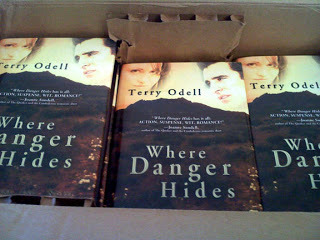 First: I got my box of author copies of Where Danger Hides. That's always exciting. Next: it's May, and I've got a new contest. Check the tab above. I've also got some new entries on my website, including a "from the cutting room floor" scene from Where Danger Hides, as well as a peek behind the scenes at the way the book started.
First: I got my box of author copies of Where Danger Hides. That's always exciting. Next: it's May, and I've got a new contest. Check the tab above. I've also got some new entries on my website, including a "from the cutting room floor" scene from Where Danger Hides, as well as a peek behind the scenes at the way the book started.
Last week, there was a lot of discussion about using deep point of view to tell a story. I thought I'd give a brief recap/explanation of the terminology, especially since I'm judging a contest for unpublished writers, and point of view, deep or otherwise, seems to be a problem for some.
Author Suzanne Brockmann uses the term "deep POV" and it seems accepted in the romance community, although it might not be an "official" definition. But, as some commenters pointed out last week, it sounds a lot like 1st person.
And yes, that's exactly what it is. When I write I want to be in the POV character's head to the point where I could substitute "I" for each use of "He" or the character's name. But writing in 3rd person POV gives the author the ability to have more than one POV character (although it's not required). There are authors who use first person for their main protagonist, and third for other characters, and it can work. There are authors who have used multiple first person POV characters. But traditionally in romance, there are two equally important characters: the hero and the heroine, and both will be POV characters. Not to say you can't have more. Suzanne Brockmann uses half a dozen or so in her books, and writes in deep POV for all of them.
In a nutshell, being in deep POV means you're in the character's head. You see only what he can see, hear only what he can hear. You're privy to emotions, to thoughts. The author isn't on the page. There is no narrator.
And, just as with first person, you have to work to let the reader know what you want her to know, or not know what you don't want her to know. Nobody said it was easy.
The following are Suzanne Brockmann's recommended rules for using deep POV to tell your story. She goes into a lot more detail, and I don't know if you can still find her giveaway booklet, "Suzanne Brockmann's Extras for Writers: Going Deep with Point of View" anywhere.
1. Don't cheat the reader. If it's logical for a character to be thinking of something in a scene, you can't hide it from the reader.
2. Make sure your characters don't notice things they would miss. This is one of my "pet peeves" with characters noticing brand names, designer labels, composers, or artists, that they logically shouldn't recognize. My favorite example – the red carpet parade before an awards show. Husband lost an argument and can't watch the game. She, if she's fashion conscious might reflect on the style of gown, perhaps even recognize the designer. The man's probably not going to go much beyond, "nice tits."
3. No unconscious thoughts. No slipping into omniscient POV. Music, which he didn't recognize as Mozart, drifted from the room. No slipping out of character. "He didn't notice Frank pour the drink." If your POV character didn't notice it, then the reader can't see it, either.
4. Don't use distancing words. Avoid 'he thought' in place of 'he said.' If you're in deep POV, the reader should know that the character is thinking. If your character is facing a man with a gun, and you write, "She was going to die," it's obvious that's what she's thinking. It's not necessary to write, "She was going to die, she thought."
5. Use anchoring words to maintain deep POV. Now, some "rule followers" might tell you to avoid these words because they're distancing, or adverbs, or some other violation. But if you're in a character's head, that character can't know for sure what someone else is thinking, seeing, hearing, etc. So, words like "seemed" "saw" or "wanted" help ground the reader. "He saw her eyebrow twitch and knew she was one step away from slapping him."
And, I'll add a reminder – whatever POV you choose, however many characters have front and center page time, it's about the transitions. If your reader follows your shifts, whether they're done with extra line breaks, asterisks, or just plain good transitional writing, then you've done your job.
To "test" yourself: Substitute "I" for "he" (or the character's name) in a scene. Is there anyone else sneaking in there? Write the entire scene again from another character's point of view. I did this as an exercise once, and it ended up being my first published work, Words. If you want to read it, you can get it free at Smashwords or All Romance eBooks.
Third person doesn't have to be deep. It just happens to be the way I like to read and write. Keeping things deep helps heighten suspense.
Tomorrow, my guest is Helen Smith, talking about literary salons in England. And by Wednesday, I hope to have my ride along notes ready to share. Keep coming back!
 First: I got my box of author copies of Where Danger Hides. That's always exciting. Next: it's May, and I've got a new contest. Check the tab above. I've also got some new entries on my website, including a "from the cutting room floor" scene from Where Danger Hides, as well as a peek behind the scenes at the way the book started.
First: I got my box of author copies of Where Danger Hides. That's always exciting. Next: it's May, and I've got a new contest. Check the tab above. I've also got some new entries on my website, including a "from the cutting room floor" scene from Where Danger Hides, as well as a peek behind the scenes at the way the book started.Last week, there was a lot of discussion about using deep point of view to tell a story. I thought I'd give a brief recap/explanation of the terminology, especially since I'm judging a contest for unpublished writers, and point of view, deep or otherwise, seems to be a problem for some.
Author Suzanne Brockmann uses the term "deep POV" and it seems accepted in the romance community, although it might not be an "official" definition. But, as some commenters pointed out last week, it sounds a lot like 1st person.
And yes, that's exactly what it is. When I write I want to be in the POV character's head to the point where I could substitute "I" for each use of "He" or the character's name. But writing in 3rd person POV gives the author the ability to have more than one POV character (although it's not required). There are authors who use first person for their main protagonist, and third for other characters, and it can work. There are authors who have used multiple first person POV characters. But traditionally in romance, there are two equally important characters: the hero and the heroine, and both will be POV characters. Not to say you can't have more. Suzanne Brockmann uses half a dozen or so in her books, and writes in deep POV for all of them.
In a nutshell, being in deep POV means you're in the character's head. You see only what he can see, hear only what he can hear. You're privy to emotions, to thoughts. The author isn't on the page. There is no narrator.
And, just as with first person, you have to work to let the reader know what you want her to know, or not know what you don't want her to know. Nobody said it was easy.
The following are Suzanne Brockmann's recommended rules for using deep POV to tell your story. She goes into a lot more detail, and I don't know if you can still find her giveaway booklet, "Suzanne Brockmann's Extras for Writers: Going Deep with Point of View" anywhere.
1. Don't cheat the reader. If it's logical for a character to be thinking of something in a scene, you can't hide it from the reader.
2. Make sure your characters don't notice things they would miss. This is one of my "pet peeves" with characters noticing brand names, designer labels, composers, or artists, that they logically shouldn't recognize. My favorite example – the red carpet parade before an awards show. Husband lost an argument and can't watch the game. She, if she's fashion conscious might reflect on the style of gown, perhaps even recognize the designer. The man's probably not going to go much beyond, "nice tits."
3. No unconscious thoughts. No slipping into omniscient POV. Music, which he didn't recognize as Mozart, drifted from the room. No slipping out of character. "He didn't notice Frank pour the drink." If your POV character didn't notice it, then the reader can't see it, either.
4. Don't use distancing words. Avoid 'he thought' in place of 'he said.' If you're in deep POV, the reader should know that the character is thinking. If your character is facing a man with a gun, and you write, "She was going to die," it's obvious that's what she's thinking. It's not necessary to write, "She was going to die, she thought."
5. Use anchoring words to maintain deep POV. Now, some "rule followers" might tell you to avoid these words because they're distancing, or adverbs, or some other violation. But if you're in a character's head, that character can't know for sure what someone else is thinking, seeing, hearing, etc. So, words like "seemed" "saw" or "wanted" help ground the reader. "He saw her eyebrow twitch and knew she was one step away from slapping him."
And, I'll add a reminder – whatever POV you choose, however many characters have front and center page time, it's about the transitions. If your reader follows your shifts, whether they're done with extra line breaks, asterisks, or just plain good transitional writing, then you've done your job.
To "test" yourself: Substitute "I" for "he" (or the character's name) in a scene. Is there anyone else sneaking in there? Write the entire scene again from another character's point of view. I did this as an exercise once, and it ended up being my first published work, Words. If you want to read it, you can get it free at Smashwords or All Romance eBooks.
Third person doesn't have to be deep. It just happens to be the way I like to read and write. Keeping things deep helps heighten suspense.
Tomorrow, my guest is Helen Smith, talking about literary salons in England. And by Wednesday, I hope to have my ride along notes ready to share. Keep coming back!
Published on May 02, 2011 04:00
April 30, 2011
And the Winners Are ...
Congratulations to the winner of my April Grab Bag Contest, LOUISE. A big envelope of goodies will be headed your way.
And the winner of my "Mystery" book from last Wednesday's post is ... BRUCE.
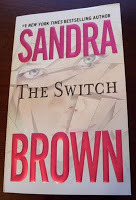 Because so many wanted to know more about the book in question: it's "The Switch" by Sandra Brown. For the record, the fact that I used the book as an example of an exercise in point of view shouldn't be construed as a plug for the book. Regular readers here know I keep my opinions off the blog, so whether or not you (or I) think it's a good read wasn't the point. It was mentioned merely as lesson in POV.
Because so many wanted to know more about the book in question: it's "The Switch" by Sandra Brown. For the record, the fact that I used the book as an example of an exercise in point of view shouldn't be construed as a plug for the book. Regular readers here know I keep my opinions off the blog, so whether or not you (or I) think it's a good read wasn't the point. It was mentioned merely as lesson in POV.
And the winner of my "Mystery" book from last Wednesday's post is ... BRUCE.
 Because so many wanted to know more about the book in question: it's "The Switch" by Sandra Brown. For the record, the fact that I used the book as an example of an exercise in point of view shouldn't be construed as a plug for the book. Regular readers here know I keep my opinions off the blog, so whether or not you (or I) think it's a good read wasn't the point. It was mentioned merely as lesson in POV.
Because so many wanted to know more about the book in question: it's "The Switch" by Sandra Brown. For the record, the fact that I used the book as an example of an exercise in point of view shouldn't be construed as a plug for the book. Regular readers here know I keep my opinions off the blog, so whether or not you (or I) think it's a good read wasn't the point. It was mentioned merely as lesson in POV.
Published on April 30, 2011 23:01
April 29, 2011
Last Chance
Don't miss out. Today's the last day to enter the Grab Bag Contest (click tab above for details), and to leave a comment on Wednesday's post to win my copy of the "mystery" book. Winners announced tomorrow.
Published on April 29, 2011 23:01
Friday Field Trip - Around the Yard
Hubster provided some of the pictures he's taken recently. He likes checking out all the wildlife, both flora and fauna. These shots are all from our yard, many taken from his window.
Reminders: Don't miss my grab bag contest (see contest tab above) or a chance to win my "mystery POV book" from Wednesday's post. Come back Sunday to see if you're a winner.








Reminders: Don't miss my grab bag contest (see contest tab above) or a chance to win my "mystery POV book" from Wednesday's post. Come back Sunday to see if you're a winner.







Published on April 29, 2011 04:00
April 28, 2011
Revisiting a Ride Along
Don't forget my grab bag contest and my 'leave a comment' drawing from Wednesday's post! Or to check back Sunday to see if you're a winner.
Today, I'm going to be on a ride along with a Teller County Deputy Sheriff. I thought it might be interesting to compare the rural setting with the more urban one in Orlando, where I did a ride along several years ago.
To make the comparison easier, I'm going to rerun that post today (from June 2007), and then I'll write up my experiences on today's journey for next week.
 I had the pleasure of doing a ride along with a deputy sheriff on Friday. I opted for the mid shift which gave me a chance to see both day and night. I also chose the sector in which I live, even though it might not have as much "action" as some of the other ones. I thought by doing this, I would learn more, as I might have more time to chat with the deputy. After all, I was doing this to learn about the 'little things' that will add realism to my books, as much as for the fun.
I had the pleasure of doing a ride along with a deputy sheriff on Friday. I opted for the mid shift which gave me a chance to see both day and night. I also chose the sector in which I live, even though it might not have as much "action" as some of the other ones. I thought by doing this, I would learn more, as I might have more time to chat with the deputy. After all, I was doing this to learn about the 'little things' that will add realism to my books, as much as for the fun.
Their day begins at 3:00 pm with a briefing and runs until 2:30 am. As a rider, I was free to decide how long I wanted to stay. Since two days earlier, two deputies had been shot in a hotel parking lot, their briefing ran long, and it was close to 4:00 (I still think in am/pm time, although everything was done on a 24 hour clock system) before I met Chris, who would more or less be responsible for my life for the next few hours. I asked if he drew the short straw when he got the assignment, but he said he normally does the ride alongs in the sector because he enjoys showing the general public what they really do on the job. I was also a tad surprised that I was doing more than 'riding' because for most of the calls, he brought me along and introduced me as a 'colleague.'
We started, immediately on a call to check on a missing person. I learned that although these are "Patrol" officers, they don't have time to roam the streets looking for bad guys or anything suspicious. They go from one call to another. If it's not an emergency, he uses the time in traffic to run plates of the cars around him. Red flag for him—overly tinted windows, but he'll do random checks. He says it's surprising what will come up, but he does need probably cause to stop someone. He did this once, with one of the too-dark windows because the driver didn't come to a stop at an intersection. Turned out the driver wasn't the car owner, but all the information he gave was correct, and the guy's record was clean, so he just told him to watch his stops and to tell his girlfriend her car was in violation of the law. He's not out to write tickets just because he can. It's about establishing a presence in the community, and being reasonable.
The zone he works has 3 deputies, and they cover a LOT of territory. They also back each other up, based on who's where, so a deputy from another zone will come if they're closer or needed.
First observation: they don't routinely park in front of the address they're investigating. An exception would be when it's a routine call to get information about something that's already happened. However, we parked halfway down the block for almost all of his calls.
There are also priorities to calls, which I learned firsthand as he was listening (with immense patience, I must add) to a "Family Dispute" from a woman who wanted "them" to do "something" about her 25 year old daughter who was on drugs and stealing from her, although she had no real proof, and couldn't make up her mind what she wanted as Chris explained the consequences of each of his options. He had started to fill out a report form when he handed it to her and said he'd be back later to pick it up. I thought he'd just reached his limit in trying to figure out what she really wanted from him, but as we got into the car and he took off with lights and sirens (GREAT FUN!), he explained he'd gotten a Code 3 to another location where they were setting up a perimeter to catch a bad guy (which is the term he used with me, although it's not the one used when cops talk to each other). That was broken off when they captured the suspect, but we were immediately sent to an "Aggravated Assault with a Weapon. We first went to talk to the victims. They didn't want to press charges, but one of the things they had talked about in their briefing was "taking the streets back" and not letting criminals call the shots, so they're making their presence known. This was in an area he is called to regularly, and this time, he told me to stay in the car and lock the doors when he got out, and he pulled a shotgun from the trunk before he went to the apartment. As he put it, "They had a gun, so we go in with a bigger gun."
While he was gone, I listened to radio calls and watched the computer screen. Everything is done from his car, as much by electronic data transmission as the radio. The computer gives him different sound effects depending on what kind of a call it is – and I can tell you, nobody would miss a "Code Three."
He had no qualms about letting me read the screen (although I've got a stiff neck this morning, because it required some twisting). He even ran my driver's license and confirmed a point I used in my book (thank goodness!) that the pre-digital licenses don't have pictures on file. Another quirk – I got a new car last February, but when he ran my license, it didn't show up.
Tomorrow is another field trip -- we're not going far this week. Come on back.
Today, I'm going to be on a ride along with a Teller County Deputy Sheriff. I thought it might be interesting to compare the rural setting with the more urban one in Orlando, where I did a ride along several years ago.
To make the comparison easier, I'm going to rerun that post today (from June 2007), and then I'll write up my experiences on today's journey for next week.
 I had the pleasure of doing a ride along with a deputy sheriff on Friday. I opted for the mid shift which gave me a chance to see both day and night. I also chose the sector in which I live, even though it might not have as much "action" as some of the other ones. I thought by doing this, I would learn more, as I might have more time to chat with the deputy. After all, I was doing this to learn about the 'little things' that will add realism to my books, as much as for the fun.
I had the pleasure of doing a ride along with a deputy sheriff on Friday. I opted for the mid shift which gave me a chance to see both day and night. I also chose the sector in which I live, even though it might not have as much "action" as some of the other ones. I thought by doing this, I would learn more, as I might have more time to chat with the deputy. After all, I was doing this to learn about the 'little things' that will add realism to my books, as much as for the fun.Their day begins at 3:00 pm with a briefing and runs until 2:30 am. As a rider, I was free to decide how long I wanted to stay. Since two days earlier, two deputies had been shot in a hotel parking lot, their briefing ran long, and it was close to 4:00 (I still think in am/pm time, although everything was done on a 24 hour clock system) before I met Chris, who would more or less be responsible for my life for the next few hours. I asked if he drew the short straw when he got the assignment, but he said he normally does the ride alongs in the sector because he enjoys showing the general public what they really do on the job. I was also a tad surprised that I was doing more than 'riding' because for most of the calls, he brought me along and introduced me as a 'colleague.'
We started, immediately on a call to check on a missing person. I learned that although these are "Patrol" officers, they don't have time to roam the streets looking for bad guys or anything suspicious. They go from one call to another. If it's not an emergency, he uses the time in traffic to run plates of the cars around him. Red flag for him—overly tinted windows, but he'll do random checks. He says it's surprising what will come up, but he does need probably cause to stop someone. He did this once, with one of the too-dark windows because the driver didn't come to a stop at an intersection. Turned out the driver wasn't the car owner, but all the information he gave was correct, and the guy's record was clean, so he just told him to watch his stops and to tell his girlfriend her car was in violation of the law. He's not out to write tickets just because he can. It's about establishing a presence in the community, and being reasonable.
The zone he works has 3 deputies, and they cover a LOT of territory. They also back each other up, based on who's where, so a deputy from another zone will come if they're closer or needed.
First observation: they don't routinely park in front of the address they're investigating. An exception would be when it's a routine call to get information about something that's already happened. However, we parked halfway down the block for almost all of his calls.
There are also priorities to calls, which I learned firsthand as he was listening (with immense patience, I must add) to a "Family Dispute" from a woman who wanted "them" to do "something" about her 25 year old daughter who was on drugs and stealing from her, although she had no real proof, and couldn't make up her mind what she wanted as Chris explained the consequences of each of his options. He had started to fill out a report form when he handed it to her and said he'd be back later to pick it up. I thought he'd just reached his limit in trying to figure out what she really wanted from him, but as we got into the car and he took off with lights and sirens (GREAT FUN!), he explained he'd gotten a Code 3 to another location where they were setting up a perimeter to catch a bad guy (which is the term he used with me, although it's not the one used when cops talk to each other). That was broken off when they captured the suspect, but we were immediately sent to an "Aggravated Assault with a Weapon. We first went to talk to the victims. They didn't want to press charges, but one of the things they had talked about in their briefing was "taking the streets back" and not letting criminals call the shots, so they're making their presence known. This was in an area he is called to regularly, and this time, he told me to stay in the car and lock the doors when he got out, and he pulled a shotgun from the trunk before he went to the apartment. As he put it, "They had a gun, so we go in with a bigger gun."
While he was gone, I listened to radio calls and watched the computer screen. Everything is done from his car, as much by electronic data transmission as the radio. The computer gives him different sound effects depending on what kind of a call it is – and I can tell you, nobody would miss a "Code Three."
He had no qualms about letting me read the screen (although I've got a stiff neck this morning, because it required some twisting). He even ran my driver's license and confirmed a point I used in my book (thank goodness!) that the pre-digital licenses don't have pictures on file. Another quirk – I got a new car last February, but when he ran my license, it didn't show up.
Tomorrow is another field trip -- we're not going far this week. Come on back.
Published on April 28, 2011 04:00
April 27, 2011
Hiding your POV character
What I'm reading: The Eagle Catcher, by Margaret Coel.
Thanks to Sharon for those wonderful insights into the inner workings of a Navy SEAL.
I recently read a book by a very well-known romance/romantic suspense author and it gave me another look at what a writer can do with Point of View. Deep Point of View means the reader sees and knows only what the character sees and knows. Yet it's possible to deliver only the information that the author wants to disclose while still being in that character's head.
 First, it's a testament to this author's skill that although I knew I was being set up, and had a pretty good idea of the final twist, I wasn't tempted to stop to analyze the 'hows' or look for clues or slipups as I read. But once I got to the end, and my suspicions were confirmed, I went back to see whether the author had in fact, "cheated" in her use of POV.
First, it's a testament to this author's skill that although I knew I was being set up, and had a pretty good idea of the final twist, I wasn't tempted to stop to analyze the 'hows' or look for clues or slipups as I read. But once I got to the end, and my suspicions were confirmed, I went back to see whether the author had in fact, "cheated" in her use of POV.
And, no, she hadn't. Which is probably why she's a best-selling author. And if you'll leave a comment, I'll enter you in a drawing to win my copy of this "mystery" book so you can see for yourself.
I don't normally like spoilers, but there's really no way to demonstrate the author's technique without giving away some major plot points. I won't name the book or the author, but you may recognize it if you've read it. If not, and if you do read it, I hope I haven't given too much away. As I said, I figured it out very early on, and the story is still a good one regardless of whether or not you know the 'truth.'
The major storyline revolves around a set of identical twins who are very close. Almost on a whim, they've changed places for a night, so Twin A is pretending to be Twin B. Twin A is murdered, and Twin B sets out to solve the crime.
Having read enough mysteries, I had a very strong hunch that Twin A was really Twin B, and that all would be revealed. Which it was, but not until almost the end of a 550 page book.
So, how did the author do this while maintaining deep character POV? First, the twin was not the only POV character in the book. There were numerous others, including the hero and quite a few others. But whenever it was the twin's POV scene, the author NEVER used her name in dialogue tags, or internal monologue. Each of these scenes would begin with another character mentioning the twin by name, or some other way to ground the reader in whose scene it was. How was this done? Here are some paraphrased examples.
"Can I get you anything, Jane?"
"No, thanks," she said.
"Jane, why don't you take this extra chair?"
She accepted with a nod of thanks.
"Good afternoon," the pleasant voice on the phone said.
"My name is Jane Doe."
You'll notice that another character is responsible for setting up the scene, establishing the POV character. After these openings, the character's name was used only in direct dialogue, when spoken by another character. Otherwise it was all pronouns. So the reader never saw the character thinking of herself by name, which avoided that sticky situation of being in a character's head and having the character "lie" to the reader. Of course, that didn't stop the character from lying to other characters, but that's part of a character maintaining a deception, and isn't "wrong" or "cheating." As far as the reader was concerned, there was no reason to wonder whether this was Twin A or Twin B.
Of course, the author also didn't go into any introspection on the part of the twin, so one never saw thoughts like, "she hated lying about who she was, but…" Yet there was no spot in the story where this seemed like the author was skirting the facts. It's not right to play coy with a reader, and this book was an excellent example of being "fair" while hiding the truth.
Don't forget. I'll send my copy of this "mystery" book to one lucky commenter. Winner announced this weekend.
Thanks to Sharon for those wonderful insights into the inner workings of a Navy SEAL.
I recently read a book by a very well-known romance/romantic suspense author and it gave me another look at what a writer can do with Point of View. Deep Point of View means the reader sees and knows only what the character sees and knows. Yet it's possible to deliver only the information that the author wants to disclose while still being in that character's head.
 First, it's a testament to this author's skill that although I knew I was being set up, and had a pretty good idea of the final twist, I wasn't tempted to stop to analyze the 'hows' or look for clues or slipups as I read. But once I got to the end, and my suspicions were confirmed, I went back to see whether the author had in fact, "cheated" in her use of POV.
First, it's a testament to this author's skill that although I knew I was being set up, and had a pretty good idea of the final twist, I wasn't tempted to stop to analyze the 'hows' or look for clues or slipups as I read. But once I got to the end, and my suspicions were confirmed, I went back to see whether the author had in fact, "cheated" in her use of POV.And, no, she hadn't. Which is probably why she's a best-selling author. And if you'll leave a comment, I'll enter you in a drawing to win my copy of this "mystery" book so you can see for yourself.
I don't normally like spoilers, but there's really no way to demonstrate the author's technique without giving away some major plot points. I won't name the book or the author, but you may recognize it if you've read it. If not, and if you do read it, I hope I haven't given too much away. As I said, I figured it out very early on, and the story is still a good one regardless of whether or not you know the 'truth.'
The major storyline revolves around a set of identical twins who are very close. Almost on a whim, they've changed places for a night, so Twin A is pretending to be Twin B. Twin A is murdered, and Twin B sets out to solve the crime.
Having read enough mysteries, I had a very strong hunch that Twin A was really Twin B, and that all would be revealed. Which it was, but not until almost the end of a 550 page book.
So, how did the author do this while maintaining deep character POV? First, the twin was not the only POV character in the book. There were numerous others, including the hero and quite a few others. But whenever it was the twin's POV scene, the author NEVER used her name in dialogue tags, or internal monologue. Each of these scenes would begin with another character mentioning the twin by name, or some other way to ground the reader in whose scene it was. How was this done? Here are some paraphrased examples.
"Can I get you anything, Jane?"
"No, thanks," she said.
"Jane, why don't you take this extra chair?"
She accepted with a nod of thanks.
"Good afternoon," the pleasant voice on the phone said.
"My name is Jane Doe."
You'll notice that another character is responsible for setting up the scene, establishing the POV character. After these openings, the character's name was used only in direct dialogue, when spoken by another character. Otherwise it was all pronouns. So the reader never saw the character thinking of herself by name, which avoided that sticky situation of being in a character's head and having the character "lie" to the reader. Of course, that didn't stop the character from lying to other characters, but that's part of a character maintaining a deception, and isn't "wrong" or "cheating." As far as the reader was concerned, there was no reason to wonder whether this was Twin A or Twin B.
Of course, the author also didn't go into any introspection on the part of the twin, so one never saw thoughts like, "she hated lying about who she was, but…" Yet there was no spot in the story where this seemed like the author was skirting the facts. It's not right to play coy with a reader, and this book was an excellent example of being "fair" while hiding the truth.
Don't forget. I'll send my copy of this "mystery" book to one lucky commenter. Winner announced this weekend.
Published on April 27, 2011 04:00
April 26, 2011
What's in a SEAL?
Today my guest is Sharon Hamilton, who writes paranormal and contemporary sensual romance. She is currently working on a three-novel series involving Navy SEALS. Her debut novel, Angel, is launching in May. She also writes erotic shorts under the pen name Angela Love. And while Sharon is taking over Terry's Place, I'm over at The Blood Red Pencil talking more about using Track Changes from the author's viewpoint. Welcome, Sharon.
My son is a Navy SEAL. His graduating class started with 192 trainees, and by the time the class was through, 7 of the original men were left. My son was the youngest in the group.
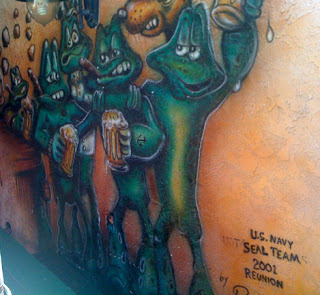 You can imagine what goes through your mind when your child tells you he has elected to put himself in harm's way. One of the first things I told him was that he was a better person than I was. But I didn't realize what kind of a course they would be going through, and what kind of commitment it took to finish.
You can imagine what goes through your mind when your child tells you he has elected to put himself in harm's way. One of the first things I told him was that he was a better person than I was. But I didn't realize what kind of a course they would be going through, and what kind of commitment it took to finish.
In the original class, there was a Senator's son, an astronaut's son, captains of several Annapolis and West Point sports teams, and several pro football players. There was a young man who gave up his chance to compete in the Olympics to try out. Most of these didn't make it. No shame in that. The training teaches a young man what his limits are. The ones that remain would jump off a twelve-story building if they were told. Just like the young SEAL did in Iraq when he fell on a grenade and saved four other team guy's lives, at the expense of his own. And he'd already been wounded earlier in the day.
My son says he feels lucky to have found something he loves doing at such a young age. He looks over at his mom and grins. I'm on my 3rd career and am now a full time writer.
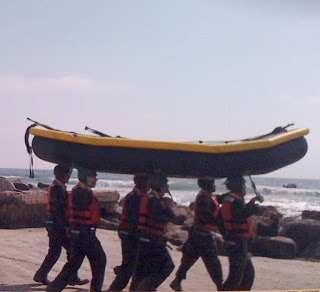 My husband and I just returned from a few days to visit him in San Diego, where he had been sent for a special training. We went down to the beach while he was working, and watched the young recruits moving their boats over the boulders, getting "wet and sandy" and familiarizing themselves with becoming a team, thinking as a team, adjusting for each other's capabilities and shortcomings, to achieve a desired outcome.
My husband and I just returned from a few days to visit him in San Diego, where he had been sent for a special training. We went down to the beach while he was working, and watched the young recruits moving their boats over the boulders, getting "wet and sandy" and familiarizing themselves with becoming a team, thinking as a team, adjusting for each other's capabilities and shortcomings, to achieve a desired outcome.
I am writing a series of SEAL stories now, and asked him to take us to a favorite tattoo parlor and one of the grills team guys would hang out. I asked him how he would know another guy belonged to a team. He told me it was the eye contact. And then he added, "Look for a group of guys who dress completely different, but are all doing the same thing."
Just after he'd graduated and received his Trident, we bought some furniture for him and his buddies, who were sharing an apartment. They were using a cardboard box for a TV stand, and didn't mind sitting on the floor to eat because they didn't have a table. We brought them some boxes of furniture from IKEA, laid them on the floor. All of the guys came over and the 6 of us sat in a circle, without saying a word, and put the furniture together. Everything was done in about twenty minutes. There was no leader. No bravado. It was a lesson in total cooperation and commitment to an objective.
I hope my stories will let others know about these fine young men, from all walks of life and backgrounds. If I have even a thimbleful of his courage, I'll achieve that goal of writing stories and characters you readers will remember for years.
For more about Sharon, you can find her at her website, blog, on Facebook and Twitter.
My son is a Navy SEAL. His graduating class started with 192 trainees, and by the time the class was through, 7 of the original men were left. My son was the youngest in the group.
 You can imagine what goes through your mind when your child tells you he has elected to put himself in harm's way. One of the first things I told him was that he was a better person than I was. But I didn't realize what kind of a course they would be going through, and what kind of commitment it took to finish.
You can imagine what goes through your mind when your child tells you he has elected to put himself in harm's way. One of the first things I told him was that he was a better person than I was. But I didn't realize what kind of a course they would be going through, and what kind of commitment it took to finish. In the original class, there was a Senator's son, an astronaut's son, captains of several Annapolis and West Point sports teams, and several pro football players. There was a young man who gave up his chance to compete in the Olympics to try out. Most of these didn't make it. No shame in that. The training teaches a young man what his limits are. The ones that remain would jump off a twelve-story building if they were told. Just like the young SEAL did in Iraq when he fell on a grenade and saved four other team guy's lives, at the expense of his own. And he'd already been wounded earlier in the day.
My son says he feels lucky to have found something he loves doing at such a young age. He looks over at his mom and grins. I'm on my 3rd career and am now a full time writer.
 My husband and I just returned from a few days to visit him in San Diego, where he had been sent for a special training. We went down to the beach while he was working, and watched the young recruits moving their boats over the boulders, getting "wet and sandy" and familiarizing themselves with becoming a team, thinking as a team, adjusting for each other's capabilities and shortcomings, to achieve a desired outcome.
My husband and I just returned from a few days to visit him in San Diego, where he had been sent for a special training. We went down to the beach while he was working, and watched the young recruits moving their boats over the boulders, getting "wet and sandy" and familiarizing themselves with becoming a team, thinking as a team, adjusting for each other's capabilities and shortcomings, to achieve a desired outcome.I am writing a series of SEAL stories now, and asked him to take us to a favorite tattoo parlor and one of the grills team guys would hang out. I asked him how he would know another guy belonged to a team. He told me it was the eye contact. And then he added, "Look for a group of guys who dress completely different, but are all doing the same thing."
Just after he'd graduated and received his Trident, we bought some furniture for him and his buddies, who were sharing an apartment. They were using a cardboard box for a TV stand, and didn't mind sitting on the floor to eat because they didn't have a table. We brought them some boxes of furniture from IKEA, laid them on the floor. All of the guys came over and the 6 of us sat in a circle, without saying a word, and put the furniture together. Everything was done in about twenty minutes. There was no leader. No bravado. It was a lesson in total cooperation and commitment to an objective.
I hope my stories will let others know about these fine young men, from all walks of life and backgrounds. If I have even a thimbleful of his courage, I'll achieve that goal of writing stories and characters you readers will remember for years.
For more about Sharon, you can find her at her website, blog, on Facebook and Twitter.
Published on April 26, 2011 05:00
April 25, 2011
Time Management
What I'm reading: Screenscam, by Michael Bowen; Kiss Me Deadly, by Michele Hauf.
My April contest is almost over - don't miss out on a chance to win a batch of goodies. Click the contest tab to enter. And thanks to all my followers: I hit the 300 milestone on Sunday.
Not long ago, I attended a workshop on time management. I couldn't stay for the whole presentation—I had to leave on time, but the speaker wasn't finished yet. (Her time management skills didn't seem to carry over to workshop time.)
 While I didn't agree with everything she said—such as blocking out one hour a day for exercise—she did make a lot of valid points. (And I don't dispute the value of exercise, I just follow a different regimen.) She also said she checks her email on a fixed schedule (never first thing in the morning), regularly deletes messages that have been sitting around too long (if it's important, they'll get back to you), and only checks her phone messages at specific times. That was a little too regimented for me. Then again, I'm not inundated with phone calls. But I do have aging parents, and the thought of telling them that if there's an emergency, they should leave a message and I'll get back to them between two and three is a bit over the top. My circles aren't the 'call and chat' types, although I spent a lot more time on the phone back in my 'stay at home mom' days.
While I didn't agree with everything she said—such as blocking out one hour a day for exercise—she did make a lot of valid points. (And I don't dispute the value of exercise, I just follow a different regimen.) She also said she checks her email on a fixed schedule (never first thing in the morning), regularly deletes messages that have been sitting around too long (if it's important, they'll get back to you), and only checks her phone messages at specific times. That was a little too regimented for me. Then again, I'm not inundated with phone calls. But I do have aging parents, and the thought of telling them that if there's an emergency, they should leave a message and I'll get back to them between two and three is a bit over the top. My circles aren't the 'call and chat' types, although I spent a lot more time on the phone back in my 'stay at home mom' days.
I also don't have a day job. And, at the moment, I'm not working on deadline, so I have a lot more flexibility with my time. That doesn't mean I use my time efficiently.
One 'trick' she suggested was one I used to use when I did have kids at home, worked, and things seemed to pile up until they seemed too daunting to tackle, and I thought it worth sharing.
Pick a dreaded task. As an example, I'll use one of the things I hated to do back then (and still do): clean the kitchen. Do the job, and make note of exactly how long it takes to do an acceptable job. Not mother-in-law clean, perhaps—maybe, 'a friend comes to the door' clean. Once you know you can tackle the job in X amount of minutes, it's easier to find the time slot when you can do it. For me, it was during sitcom time. As I recall, I loved Mary Tyler Moore and Rhoda, but in between the two was Phyllis, which I didn't care for. So, I had thirty 'spare' minutes, and knowing I could have the kitchen done in that amount of time meant that I did it.
Our speaker recommended thinking of tasks in terms of dots and dashes. You've probably got a lot of "dot" type tasks. Things that don't take long at all. When you've got a few minutes, tackle those. Maybe it's make a dental appointment. Or sort the laundry. Then, when you have more time, you can deal with the longer, "dash" tasks." (I wish "someone" at our house understood this system, instead of saying, "I'll take care of it," and then letting it age like a barrel of whiskey before actually doing it, even though it would take about a minute to do it, and then it would be done. Instead, I get, "It's on my list.")
And speaking of lists, another point our speaker made was that a "to do" without a "when" is useless. Commit to a deadline for each task.
What works for you when it comes to managing your time?
Tomorrow my guest is Sharon Hamilton who's talking about her experiences with Navy SEALS. Make sure you set aside enough time to come back to read it!
My April contest is almost over - don't miss out on a chance to win a batch of goodies. Click the contest tab to enter. And thanks to all my followers: I hit the 300 milestone on Sunday.
Not long ago, I attended a workshop on time management. I couldn't stay for the whole presentation—I had to leave on time, but the speaker wasn't finished yet. (Her time management skills didn't seem to carry over to workshop time.)
 While I didn't agree with everything she said—such as blocking out one hour a day for exercise—she did make a lot of valid points. (And I don't dispute the value of exercise, I just follow a different regimen.) She also said she checks her email on a fixed schedule (never first thing in the morning), regularly deletes messages that have been sitting around too long (if it's important, they'll get back to you), and only checks her phone messages at specific times. That was a little too regimented for me. Then again, I'm not inundated with phone calls. But I do have aging parents, and the thought of telling them that if there's an emergency, they should leave a message and I'll get back to them between two and three is a bit over the top. My circles aren't the 'call and chat' types, although I spent a lot more time on the phone back in my 'stay at home mom' days.
While I didn't agree with everything she said—such as blocking out one hour a day for exercise—she did make a lot of valid points. (And I don't dispute the value of exercise, I just follow a different regimen.) She also said she checks her email on a fixed schedule (never first thing in the morning), regularly deletes messages that have been sitting around too long (if it's important, they'll get back to you), and only checks her phone messages at specific times. That was a little too regimented for me. Then again, I'm not inundated with phone calls. But I do have aging parents, and the thought of telling them that if there's an emergency, they should leave a message and I'll get back to them between two and three is a bit over the top. My circles aren't the 'call and chat' types, although I spent a lot more time on the phone back in my 'stay at home mom' days.I also don't have a day job. And, at the moment, I'm not working on deadline, so I have a lot more flexibility with my time. That doesn't mean I use my time efficiently.
One 'trick' she suggested was one I used to use when I did have kids at home, worked, and things seemed to pile up until they seemed too daunting to tackle, and I thought it worth sharing.
Pick a dreaded task. As an example, I'll use one of the things I hated to do back then (and still do): clean the kitchen. Do the job, and make note of exactly how long it takes to do an acceptable job. Not mother-in-law clean, perhaps—maybe, 'a friend comes to the door' clean. Once you know you can tackle the job in X amount of minutes, it's easier to find the time slot when you can do it. For me, it was during sitcom time. As I recall, I loved Mary Tyler Moore and Rhoda, but in between the two was Phyllis, which I didn't care for. So, I had thirty 'spare' minutes, and knowing I could have the kitchen done in that amount of time meant that I did it.
Our speaker recommended thinking of tasks in terms of dots and dashes. You've probably got a lot of "dot" type tasks. Things that don't take long at all. When you've got a few minutes, tackle those. Maybe it's make a dental appointment. Or sort the laundry. Then, when you have more time, you can deal with the longer, "dash" tasks." (I wish "someone" at our house understood this system, instead of saying, "I'll take care of it," and then letting it age like a barrel of whiskey before actually doing it, even though it would take about a minute to do it, and then it would be done. Instead, I get, "It's on my list.")
And speaking of lists, another point our speaker made was that a "to do" without a "when" is useless. Commit to a deadline for each task.
What works for you when it comes to managing your time?
Tomorrow my guest is Sharon Hamilton who's talking about her experiences with Navy SEALS. Make sure you set aside enough time to come back to read it!
Published on April 25, 2011 04:00



